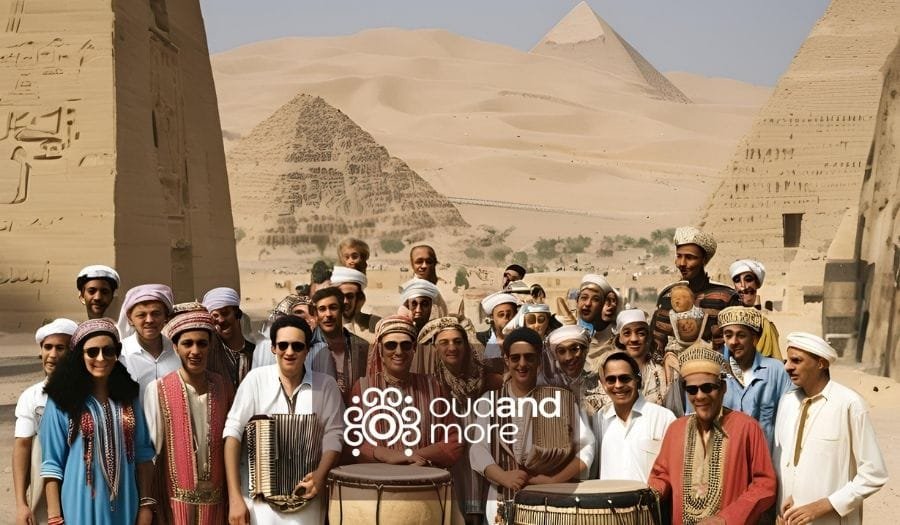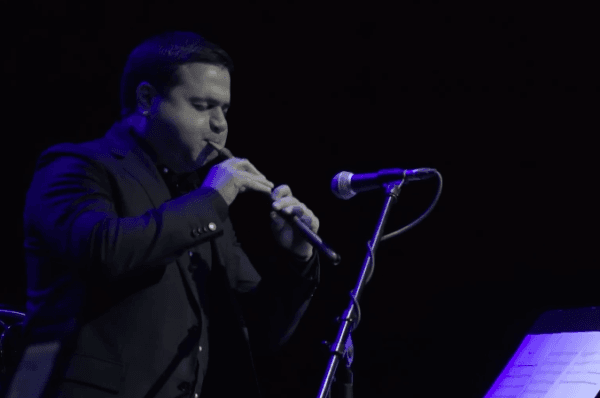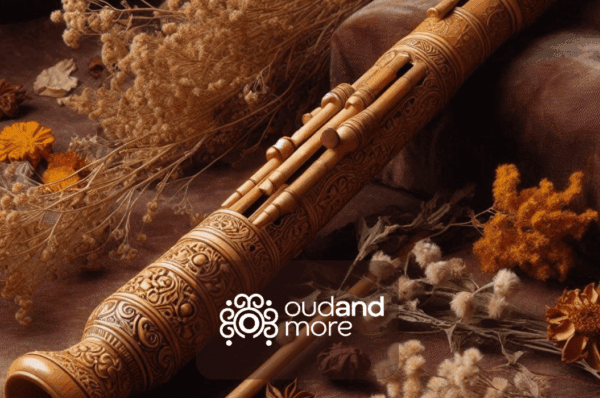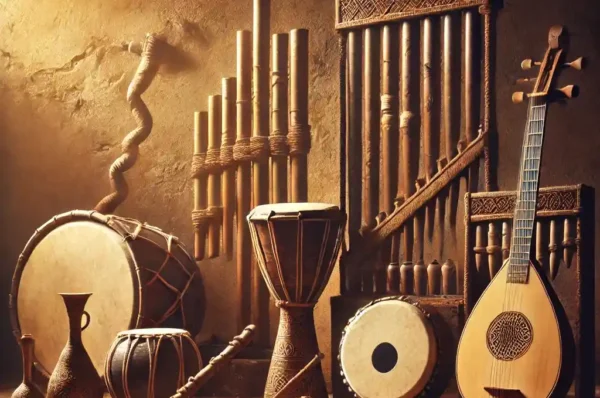Egypt’s musical heritage is one of the oldest and most influential in the world. From the ancient times of the Pharaohs to the vibrant music scene of modern-day Cairo, Egypt has been a cradle for diverse musical traditions. This article will explore the history, significance, and characteristics of Egyptian musical instruments, focusing on both percussion and stringed instruments.
1. The Historical Roots of Egyptian Music
- Ancient Egypt’s Musical Legacy: Discuss how music was integral to religious ceremonies, royal courts, and daily life in ancient Egypt. Mention key archaeological findings, such as depictions of musicians in tombs and temples.
- Influence on Neighboring Cultures: Explore how Egyptian music influenced neighboring civilizations, such as the Greeks and Romans, and how it played a role in the cultural exchange along the Nile.
2. Egyptian Percussion Instruments
- Darbuka (Doumbek): Delve into the history and significance of the darbuka, a goblet-shaped drum that is central to Egyptian music. Include details about its construction, playing techniques, and its role in both traditional and contemporary Egyptian music.
- Riq: Discuss the riq, a type of tambourine with jingles, highlighting its use in classical Arabic music ensembles and folk traditions.
- Mizhar: Describe this large frame drum, traditionally used in religious and festive contexts, and how it contributes to the rhythmic foundation of Egyptian music.
- Tabla Baladi: Explain the role of the tabla baladi in Egyptian folk music and its importance in rural cultural expressions.
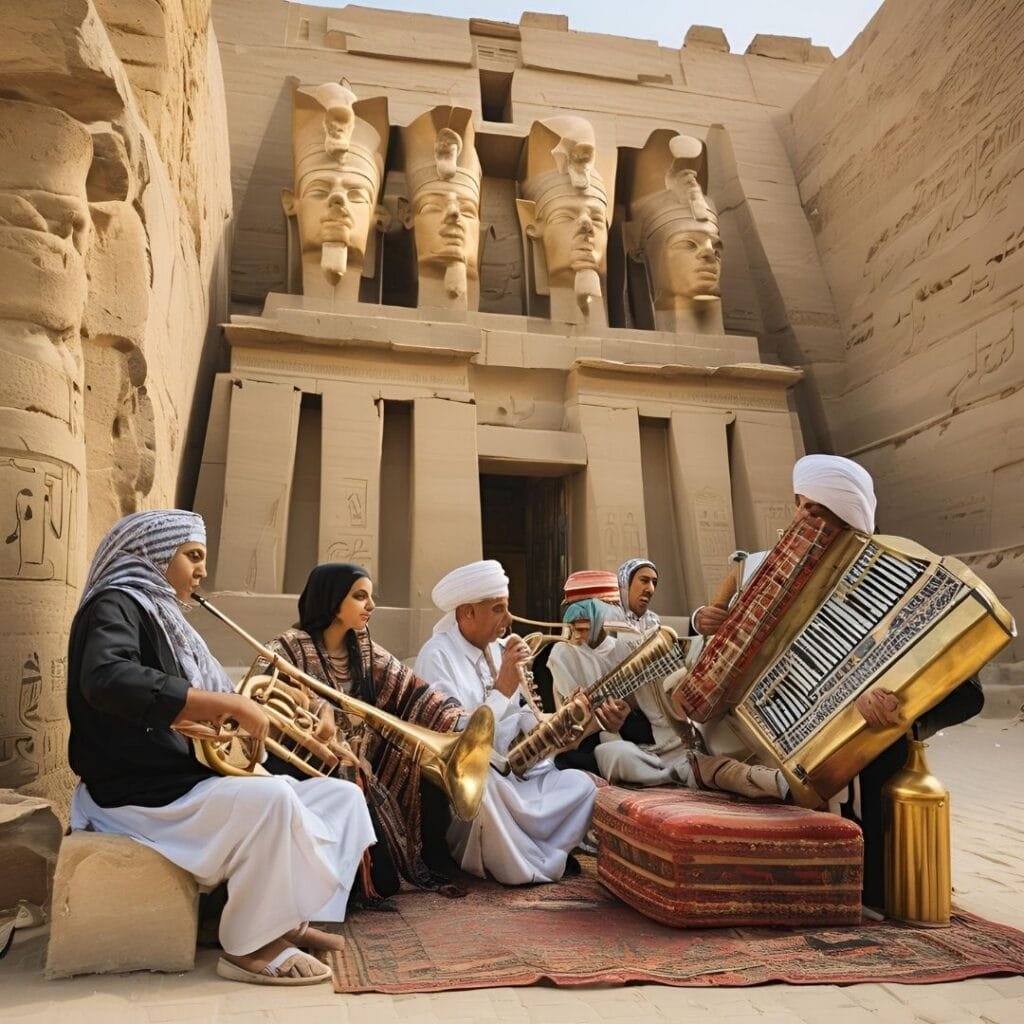
3. Egyptian Stringed Instruments
- Oud: Provide an overview of the oud, its origins, and its deep cultural significance in Egyptian music. Discuss its role as a precursor to the lute and its influence on other musical traditions.
- Qanun: Explore the qanun, a zither-like instrument known for its delicate, harp-like sound. Discuss its historical development and current use in both traditional and popular Egyptian music.
- Simsimiyya: Introduce the simsimiyya, a lyre-like instrument traditionally associated with the folk music of the Suez Canal region. Discuss its cultural importance and unique sound.
- Rabab: Discuss the rabab, a bowed string instrument that has ancient origins and is still used in rural and Bedouin music.
4. The Role of Music in Egyptian Culture
- Music in Religious and Spiritual Life: Explore how music has been a vital part of religious ceremonies, including ancient rituals and contemporary Islamic and Coptic practices.
- Music in Social and Political Life: Discuss the role of music in social gatherings, weddings, and political events. Highlight key moments in Egyptian history where music played a significant role in expressing social and political sentiments.
- The Influence of Egyptian Music in the Arab World: Explain how Egyptian music has shaped and influenced the broader Arab music scene, from classical Arabic music to modern pop.
5. Notable Egyptian Musicians and Composers
- Umm Kulthum: Discuss the legacy of Umm Kulthum, often referred to as “The Voice of Egypt,” and her contributions to the development of modern Arabic music.
- Mohamed Abdel Wahab: Highlight the works of Mohamed Abdel Wahab, a composer and singer who blended traditional Egyptian music with Western musical elements.
- Abdel Halim Hafez: Explore the impact of Abdel Halim Hafez, a celebrated singer and actor, on Egyptian music and his lasting influence on Arabic pop music.
6. Modern Egyptian Music and Its Global Influence
- Contemporary Egyptian Artists: Introduce contemporary Egyptian musicians and bands who are blending traditional sounds with modern genres like jazz, rock, and electronic music.
- Global Reach: Discuss the global influence of Egyptian music, particularly how it has inspired musicians and composers around the world.
Egypt’s musical instruments and rich cultural heritage continue to inspire and resonate globally. From the ancient percussion instruments that laid the foundation of rhythm to the stringed instruments that added melodic depth, Egyptian music is a testament to the country’s enduring influence on the world stage.

